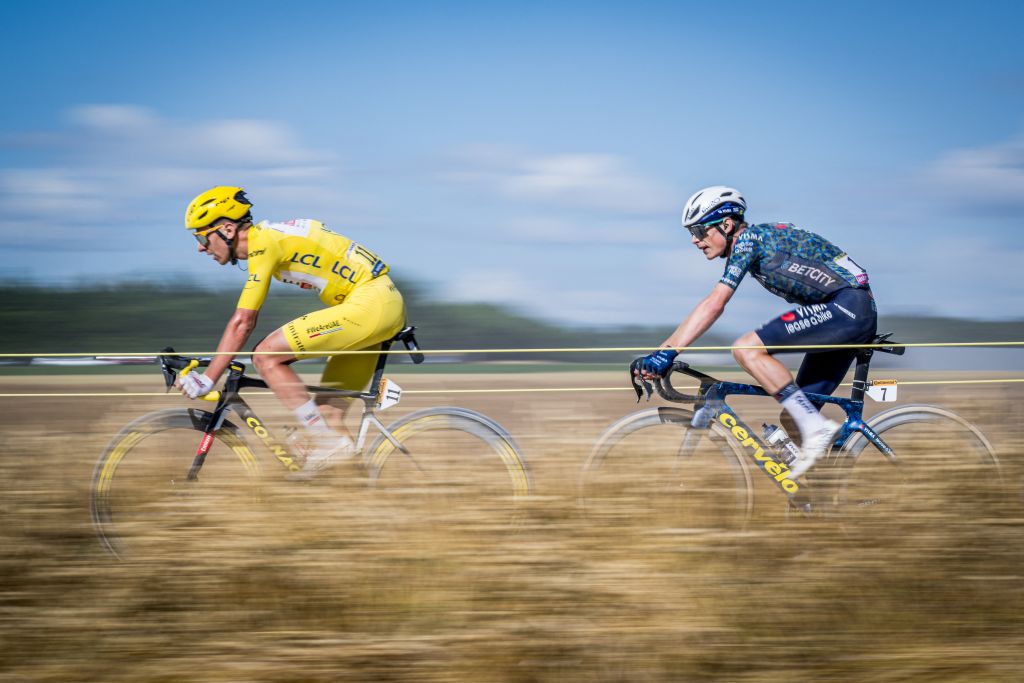
Jonas Vingegaard has explained that his lack of interest in collaborating with Tadej Pogačar during the Tour de France gravel stage 9 on Sunday, when the two managed to drop the rest of the GC rivals, was based on a team strategy of always remaining with his teammates for as long as possible.
On a day when Pogačar went on the rampage on multiple occasions, repeatedly stringing out the field, and trying to drop his rivals, Vingegaard recognised to reporters that it would have been ideal for him, too, to collaborate with Pogačar to take more time on their joint rivals Remco Evenepoel (Soudal-QuickStep) and Primož Roglič (Red Bull-Bora-Hansgrohe).
Both Evenepoel and Roglič were distanced when Vingegaard bridged across - with some assistance from Matteo Jorgenson and Christophe Laporte - to one of Pogačar’s most ferocious attacks. On other occasions, it was just Roglič who was dropped.
But no matter the combination of riders ahead, one thing stayed constant: Vingegaard was never willing to help Pogačar, opting instead to try to defuse any attempt to blow the race apart.
“He was riding so fast himself, we didn’t think about it,” Vingegaard told reporters later. “But in all kinds of situations, we thought it was better for us to have more teammates in case something happened.”
“So, of course, in some way, it would have been better to ride because Primož and Remco were not there. But on the other hand, our goal was not to lose time, so maybe it was better to wait.”
Vingegaard’s more cautious approach was perhaps justified by his rollercoaster experiences on the gravel roads around Troyes. Not only did he have to spend nearly 100 kilometres on a teammate’s bike and handle a non-stop avalanche of Pogačar attacks, Vingegaard also had two punctures in the stage, which likely acted as further reminders of the wisdom of not being overly isolated, as could have happened had he worked with the Slovenian.
“I’m, of course, very relieved that I made it safely to the finish without losing any time and only two punctures,” Vingegaard said in what appeared to be a humorous reference to his multiple mishaps.
“I had one when I got onto Jan’s bike, and actually, it happened again in the last three kilometres. That was only half a puncture, but I could still finish on the same bike.
“So I owe all my teammates a big big thank you, and they did super well today. Jan gave me the bike; it was a perfect fit, and the rest of the guys kept me in the front. I entered every sector in first position and they even closed the gap for me one time when I couldn’t follow. So, I owe them big time after one.”
The dependence on Jorgenson and Laporte to bring him back up to Pogačar some 30 kilometres from the line probably made it even more unlikely for Visma to change their minds about how risky it would be to work with the Slovenian. But as Vingegaard explained, too, their presence helped compensate for one major chink in his armour when it came to racing over gravel: his weight, compared to that of his arch-rival.
Asked who was the strongest on the gravel, Vingegaard - whom Vingegaard implied was more lightly built - said unhesitatingly, “Tadej was. [But] also it [the gravel] favours him also more than favours me, specially when the gravel was looser.”
“For a guy of my weight, it’s [looser gravel] is not favourable, and that was also when he got a small gap on me; it was probably the worst sector of all. It was so loose that I was just sliding around, to be honest. It was really hard for me to control the bike.”
Yet for all Vingegaard underlined his opposition to the inclusion of gravel stages on Grand Tours, branding them as ‘unnecessary’, and for all it had clearly been a very fraught day of racing, he reached the team bus looking relaxed and with a smile on his face, one reporter pointed out.
“I think maybe after the crash,” - in Itzulia Basque Country in April, where he was badly injured he could not race until the Tour de France - “ I realised what life was about,” VIngegaard explained, “And it’s more about family and living life rather than cycling, so maybe in that way I feel less pressure, and I enjoy it more.”
Get unlimited access to all of our coverage of the Tour de France - including breaking news and analysis reported by our journalists on the ground from every stage of the race as it happens and more. Find out more







